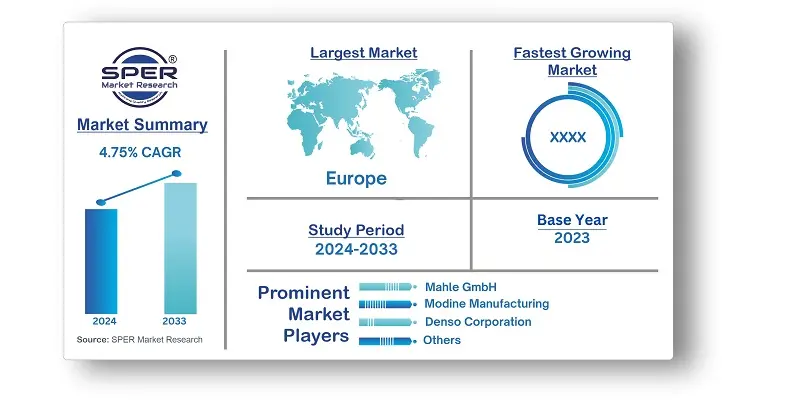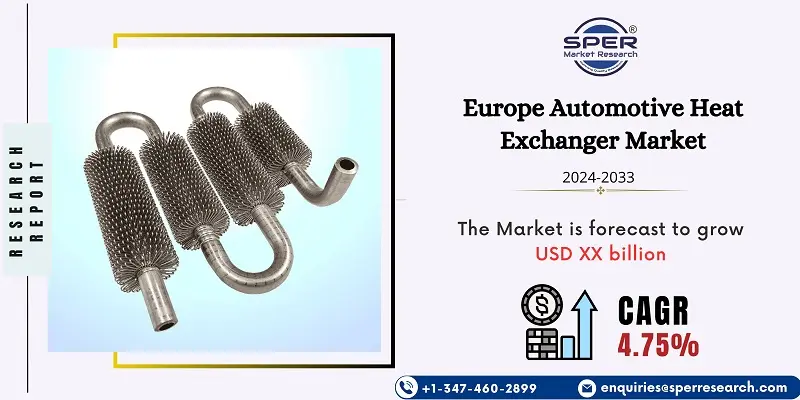
Europe Automotive Heat Exchanger Market Trends, Share, Demand, Revenue and Future Outlook
Europe Automotive Heat Exchanger Market Growth, Size, Trends Analysis- By Application, By Design Type, By Vehicle Type- Regional Outlook, Competitive Strategies and Segment Forecast to 2033
| Published: Nov-2024 | Report ID: AMIN24240 | Pages: 1 - 152 | Formats*: |
| Category : Automotive & Transportation | |||
- In February 2023, SANHUA introduced a variety of steel Brazed Plate Heat Exchangers (BPHE) in different types. These heat exchangers use renewable energy and technology to save energy, reduce emissions, improve heat transfer efficiency, and prevent pressure drops.
- Conflux and GKN Additive announced intentions in May 2022 to collaborate on the development, design, and production of 3D-printed heat exchanger solutions in Europe. 3D-printed heat exchangers have been shown to improve the cooling of essential automobile components by leveraging the design freedom provided by 3D printing.

- Technological advancements: The development of more efficient and compact heat exchanger designs is driving market expansion. Improved heat transfer efficiency and weight reduction contribute to greater vehicle performance and fuel economy, which appeals to manufacturers seeking higher efficiency criteria.
- Increased vehicle manufacturing: Rising consumer demand and economic development are driving up automotive production, which increases demand for heat exchangers. As more vehicles are manufactured, the demand for these components rises, presenting prospects for market expansion.
- Strong emission regulations: Regulations aiming at lowering car emissions and increasing fuel efficiency have boosted demand for innovative heat exchangers. These components are critical for controlling engine temperature and optimizing performance to meet severe environmental criteria.
- High development costs: Research and technological expenditures are frequently necessary for the creation and manufacturing of sophisticated heat exchangers. High production and innovation expenses can affect profit margins and make it more difficult for smaller companies to enter new markets.
- Supply chain interruptions: The automobile sector is prone to supply chain interruptions as a result of raw material shortages and geopolitical unrest. The stability of the market may be impacted by these interruptions since they may cause delays and higher expenses for heat exchanger producers.

| Report Metric | Details |
| Market size available for years | 2020-2033 |
| Base year considered | 2023 |
| Forecast period | 2024-2033 |
| Segments covered | By Application, By Design Type, By Vehicle Type |
| Regions covered | Germany, UK, France, Spain, Italy |
| Companies Covered | Valeo S.A, Granges, Mahle GmbH, Modine Manufacturing, G&M radiators, Constellium N.V, Denso Corporation. |
- Automotive OEMs
- Automotive Heat Exchanger Manufacturers
- Automotive Component Suppliers
- Electric and Hybrid Vehicle Manufacturers
- Aftermarket Parts Suppliers and Distributors
- Research and Development Institutions
- Government and Regulatory Bodies
- Automotive Dealerships and Service Centers
- Automotive Industry Consultants and Analysts
- Environmental and Sustainability Organizations
| By Application: | |
| By Design Type: | |
| By Vehicle Type: | |
| By Region: |
- Europe Automotive Heat Exchanger Market Size (FY’2024-FY’2033)
- Overview of Europe Automotive Heat Exchanger Market
- Segmentation of Europe Automotive Heat Exchanger Market By Application (Radiators, Oil Coolers, Intercoolers, Air Conditioning and Condenser, Exhaust Gas Heat Exchanger, Others)
- Segmentation of Europe Automotive Heat Exchanger Market by Design Type (Tube/Fin, Plate-Bar, Plate-Fin, Extrusion Fin/Others, Others)
- Segmentation of Europe Automotive Heat Exchanger Market by Vehicle Type (Electric Vehicles, Conventional Vehicles)
- Statistical Snap of Europe Automotive Heat Exchanger Market
- Expansion Analysis of Europe Automotive Heat Exchanger Market
- Problems and Obstacles in Europe Automotive Heat Exchanger Market
- Competitive Landscape in Europe Automotive Heat Exchanger Market
- Impact of COVID-19 and Demonetization on Europe Automotive Heat Exchanger Market
- Details on Current Investment in Europe Automotive Heat Exchanger Market
- Competitive Analysis of Europe Automotive Heat Exchanger Market
- Prominent Players in Europe Automotive Heat Exchanger Market
- SWOT Analysis of Europe Automotive Heat Exchanger Market
- Europe Automotive Heat Exchanger Market Future Outlook and Projections (FY’2024-FY’2033)
- Recommendations from Analyst
1.1. Scope of the report1.2. Market segment analysis
2.1. Research data source
2.1.1. Secondary Data2.1.2. Primary Data2.1.3. SPER’s internal database2.1.4. Premium insight from KOL’s
2.2. Market size estimation
2.2.1. Top-down and Bottom-up approach
2.3. Data triangulation
4.1. Driver, Restraint, Opportunity and Challenges analysis
4.1.1. Drivers4.1.2. Restraints4.1.3. Opportunities4.1.4. Challenges
4.2. COVID-19 Impacts of the Europe Automotive Heat Exchanger Market.
5.1. SWOT Analysis
5.1.1. Strengths5.1.2. Weaknesses5.1.3. Opportunities5.1.4. Threats
5.2. PESTEL Analysis
5.2.1. Political Landscape5.2.2. Economic Landscape5.2.3. Social Landscape5.2.4. Technological Landscape5.2.5. Environmental Landscape5.2.6. Legal Landscape
5.3. PORTER’s Five Forces
5.3.1. Bargaining power of suppliers5.3.2. Bargaining power of buyers5.3.3. Threat of Substitute5.3.4. Threat of new entrant5.3.5. Competitive rivalry
5.4. Heat Map Analysis
6.1. Europe Automotive Heat Exchanger Market Manufacturing Base Distribution, Sales Area, Product Type6.2. Mergers & Acquisitions, Partnerships, Product Launch, and Collaboration in Europe Automotive Heat Exchanger Market
7.1. Europe Automotive Heat Exchanger Market Size, Share and Forecast, By Application, 2020-20267.2. Europe Automotive Heat Exchanger Market Size, Share and Forecast, By Application, 2027-20337.3. Radiators7.4. Oil Coolers7.5. Intercoolers7.6. Air Conditioning and Condenser7.7. Exhaust Gas Heat Exchanger7.8. Others
8.1. Europe Automotive Heat Exchanger Market Size, Share and Forecast, By Design Type, 2020-20268.2. Europe Automotive Heat Exchanger Market Size, Share and Forecast, By Design Type, 2027-20338.3. Tube/Fin8.4. Plate-Bar8.5. Plate-Fin8.6. Extrusion Fin/Others8.7. Others
9.1. Europe Automotive Heat Exchanger Market Size, Share and Forecast, By Vehicle Type, 2020-20269.2. Europe Automotive Heat Exchanger Market Size, Share and Forecast, By Vehicle Type, 2027-20339.3. Electric Vehicle9.4. Conventional Vehicle
10.1. Europe Automotive Heat Exchanger Market Size and Market Share
11.1. Europe Automotive Heat Exchanger Market Size and Market Share By Region (2020-2026)11.2. Europe Automotive Heat Exchanger Market Size and Market Share By Region (2027-2033)11.3. Germany11.4. UK11.5. France11.6. Spain11.7. Italy
12.1. Valeo S.A
12.1.1. Company details12.1.2. Financial outlook12.1.3. Product summary12.1.4. Recent developments
12.2. Granges
12.2.1. Company details12.2.2. Financial outlook12.2.3. Product summary12.2.4. Recent developments
12.3. Mahle GmbH
12.3.1. Company details12.3.2. Financial outlook12.3.3. Product summary12.3.4. Recent developments
12.4. Modine Manufacturing
12.4.1. Company details12.4.2. Financial outlook12.4.3. Product summary12.4.4. Recent developments
12.5. G&M radiators
12.5.1. Company details12.5.2. Financial outlook12.5.3. Product summary12.5.4. Recent developments
12.6. Constellium N.V
12.6.1. Company details12.6.2. Financial outlook12.6.3. Product summary12.6.4. Recent developments
12.7. Denso Corporation
12.7.1. Company details12.7.2. Financial outlook12.7.3. Product summary12.7.4. Recent developments
12.8. others
SPER Market Research’s methodology uses great emphasis on primary research to ensure that the market intelligence insights are up to date, reliable and accurate. Primary interviews are done with players involved in each phase of a supply chain to analyze the market forecasting. The secondary research method is used to help you fully understand how the future markets and the spending patterns look likes.
The report is based on in-depth qualitative and quantitative analysis of the Product Market. The quantitative analysis involves the application of various projection and sampling techniques. The qualitative analysis involves primary interviews, surveys, and vendor briefings. The data gathered as a result of these processes are validated through experts opinion. Our research methodology entails an ideal mixture of primary and secondary initiatives.



Frequently Asked Questions About This Report
PLACE AN ORDER
Year End Discount
Sample Report
Pre-Purchase Inquiry
NEED CUSTOMIZATION?
Request CustomizationCALL OR EMAIL US
100% Secure Payment






Related Reports
Our Global Clients
Our data-driven insights have influenced the strategy of 200+ reputed companies across the globe.






















